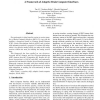Free Online Productivity Tools
i2Speak
i2Symbol
i2OCR
iTex2Img
iWeb2Print
iWeb2Shot
i2Type
iPdf2Split
iPdf2Merge
i2Bopomofo
i2Arabic
i2Style
i2Image
i2PDF
iLatex2Rtf
Sci2ools
BMEI
2009
IEEE
2009
IEEE
A Framework of Adaptive Brain Computer Interfaces
Non-stationarity is often found in session-to-session transfers of Brain Computer Interfaces (BCIs). To cope with the problem, a framework based on Common Spatial Patterns (CSP), Linear Discriminant Analysis (LDA), and covariate shift adaptation methods is proposed. Covariate shift adaptation is an effective method which can adapt to the testing sessions without the need for labeling the testing session data. This framework has been applied on one electrocorticogram (ECoG) dataset and one Electroencephalogram (EEG) dataset from BCI Competition III. Despite the different characteristics of ECoG and EEG, non-stationarity appeared in both datasets. Results showed that the proposed framework compares favorably with those methods used in the BCI Competition, revealing the effectiveness of covariate shift adaptation in tackling the non-stationarity in Brain Computer Interfaces.
BCI Competition | Biomedical Imaging | BMEI 2009 | Brain Computer Interfaces | Covariate Shift Adaptation |
Related Content
| Added | 08 Nov 2010 |
| Updated | 08 Nov 2010 |
| Type | Conference |
| Year | 2009 |
| Where | BMEI |
| Authors | Yan Li, Yasuharu Koike, Masashi Sugiyama |
Comments (0)

